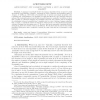Free Online Productivity Tools
i2Speak
i2Symbol
i2OCR
iTex2Img
iWeb2Print
iWeb2Shot
i2Type
iPdf2Split
iPdf2Merge
i2Bopomofo
i2Arabic
i2Style
i2Image
i2PDF
iLatex2Rtf
Sci2ools
113
click to vote
SIAMCOMP
1998
1998
L-Printable Sets
A language is L-printable if there is a logspace algorithm which, on input 1n, prints all members in the language of length n. Following the work of Allender and Rubinstein [SIAM J. Comput., 17 (1988), pp. 1193–1202] on P-printable sets, we present some simple properties of the L-printable sets. This definition of “L-printable” is robust and allows us to give alternate characterizations of the L-printable sets in terms of tally sets and Kolmogorov complexity. In addition, we show that a regular or context-free language is L-printable if and only if it is sparse, and we investigate the relationship between L-printable sets, L-rankable sets (i.e., sets A having a logspace algorithm that, on input x, outputs the number of elements of A that precede x in the standard lexicographic ordering of strings), and the sparse sets in L. We prove that under reasonable complexity-theoretic assumptions, these three classes of sets are all different. We also show that the class of sets of small...
| Added | 23 Dec 2010 |
| Updated | 23 Dec 2010 |
| Type | Journal |
| Year | 1998 |
| Where | SIAMCOMP |
| Authors | Lance Fortnow, Judy Goldsmith, Matthew A. Levy, Stephen R. Mahaney |
Comments (0)

